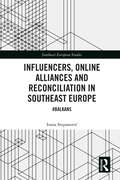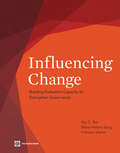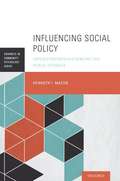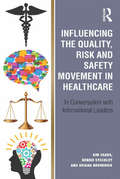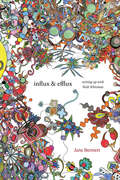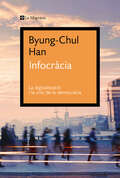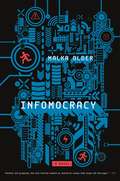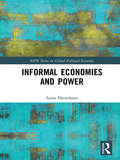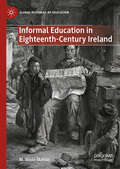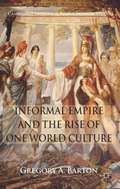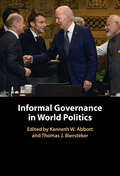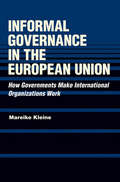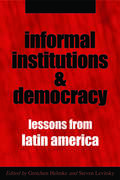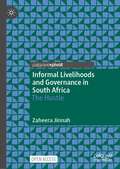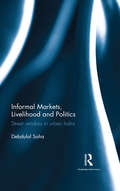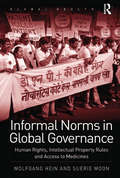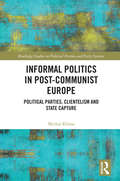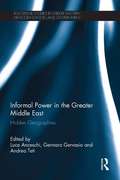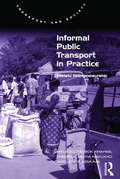- Table View
- List View
Influencers, Online Alliances and Reconciliation in Southeast Europe: #Balkans (Southeast European Studies)
by Ivana StepanovicThis book explores the transformative role of social media in fostering reconciliation in the former Yugoslavia, a region still grappling with unresolved conflicts and ethnic divides. Focusing on platforms like YouTube and TikTok, it highlights how Balkan influencers blend personal storytelling with commercial outreach to promote interethnic understanding. The study employs digital ethnography and narrative analysis to reveal the intricate dynamics between human actors and algorithms, uncovering how social media facilitate grassroots reconciliation initiatives.The author critiques traditional reconciliation efforts driven by political elites and emphasises the potential of bottom-up approaches enabled by social media. It presents the concept of “algorithmic reconciliation”, where social media algorithms inadvertently foster interethnic collaborations and create transnational online communities. By examining the economic and cultural practices of influencers, the book illustrates how digital platforms can serve as modern arenas for peacebuilding.This book is primarily aimed at undergraduates and postgraduates in social history, digital media studies, and peace studies, but will also be relevant to academics, policymakers, and anyone interested in the intersection of technology and social change.
Influencing Change
by Ray C. Rist Marie-Helene Boily Frederic MartinIn the first section of this book, four chapters explore how evaluation can influence and interact with the change process in policy and institutional development. Wijayatilake recalls a convincing and riveting story about how evaluation was introduced in Sri-Lanka and what kind of striking results could be achieved in a few years through a progressive pragmatic approach and strong leadership. Wiesner reviews the role of evaluation in the formation of macroeconomic policy in Latin America and outlines the role of demand for improved results and performance and of the accountability from the politicians, the private sector and civil society and, in the end, the population. Dimitrov proposes a 7 step approach for tacking institutional Performance evaluation and applies it to the case of the Black Sea Trade and Development Bank. Jaljouli addresses the challenge of the integration of development strategy and the evaluation process and uses Dubai as a case study. In the second section of this book, five chapters present a variety of lessons learnt and good practices in Evaluation Capacity Building (ECB). Heider presents a structured approach to capacity development working at three levels: individual training, institutional development, and an enabling environment and suggests moving from capacities to capabilities. Agrawal and Rao identify various factions influencing the use of evaluation results and show in the case of India how capacity building was used to increase this use. Andriantseheno addresses how an M and E system for a major development program can be set up as part of a programmatic approach using the case study of the Environment/Rural Development and Food Security program in Madagascar. Porter outlines the potential of the helping approaches an evaluation capacity development strategy and uses the Bana Barona/Abantwanu Bethu project in South Africa to prove his point. Clotteau et al. review major challenges in ECB and present a variety of ECB strategies to design and implement Results-Based National M and E systems, building upon a number of experiences in Africa, Asia, and Latin America. The third section of the book discusses new perspectives on ECB. Picciotto outlines a path for the future of development evaluation on the basis of a review of emerging endogenous and exogenous trends. By surveying recent theoretical developments in ECB, Nielsen and Attström map the perspectives offered by the contributors in terms of scope, purpose, definitions, and methods and relate key findings and recommendations to the ECB framework offered by Heider' chapter. Van den Berg illustrates how evaluation capacity has been developed and could be further developed in a critical area for the future, i.e. in environment and development. From a review of the first and second sections of the book, Dahlgren underlines that building up evaluation capacity requires not only competence and quality, but taking into account the political and institutional context, cost aspects, the relative importance between learning and accountability, and the differences and similarities between monitoring and evaluation. Finally, following a review of the same papers, McAllister explores the interface between the evaluation function and organizational leadership in setting results strategy and the limitation of results approaches as implemented by the international development community. Overall, the stimulating comparative analysis of the papers presented in sections 1 and 2, questions and own thoughts on perspectives for ECB in the future made by those senior evaluation specialists allow for a more thorough and nuanced book.
Influencing Social Policy: Applied Psychology Serving the Public Interest (Advances In Community Psychology Ser.)
by Kenneth I. MatonInfluencing Social Policy synthesizes current knowledge about how psychologists influence social policy to serve the public interest. The volume builds upon interviews with 79 applied psychologists about their experiences in the policy domain, with special focus on the work of applied developmental psychologists, applied social psychologists, and community psychologists. Additional foundations of the volume include a review of social science scholarship across a wide range of disciplines, and author Kenneth Maton's 30 years of teaching on the topic, including frequent interactions with Washington, DC, policy experts. <P><P>Together, these sources provide in-depth information about how applied psychologists influence social policy, the factors that contribute to their success, the challenges they face, and the approaches used to address those challenges. The policy influences described span all three branches of government: legislative, executive, and judicial. The policy content areas are diverse, including the death penalty prohibition for adolescents, early childhood education, gay marriage, gender discrimination in the workplace, health and mental health care reform, homelessness, home visiting programs, sexually abused child witness treatment, status offender diversion from the juvenile justice system, substance abuse prevention, and many others. Influencing Social Policy is a must-have resource for graduate students and professionals in a wide variety of disciplines with interests in influencing social policy, including psychology, education, public health, social work, policy studies, anthropology, and sociology.
Influencing the Quality, Risk and Safety Movement in Healthcare: In Conversation with International Leaders
by Kim Sears Denise StockleyInfluencing the Quality, Risk and Safety Movement in Healthcare explores the inner workings of some of the most influential minds in healthcare quality, risk and safety. The book was created in cooperation with the Master of Science in Healthcare Quality graduate program, developed and delivered by Queen’s University, Canada. This is the only standalone interdisciplinary Master of Science graduate degree in Healthcare Quality in North America that focuses on creating tomorrow’s healthcare leaders. Following a one-to-one collaboration between each leader in healthcare with a dedicated learner of the MSc(HQ), readers are presented with a synopsis of the leader’s work followed by an in-depth interview with him or her. Interviews center around the leaders’ contributions to and thoughts on quality, risk and safety in healthcare, dealing with topics such as the development of their body of work, their greatest achievements, what they wish they could change, and future direction of quality, risk and safety, etc. The book provides a unique and highly accessible view into how and why the science of healthcare quality has developed, as well as giving a first-hand account of the founders and key players in the movement. It will offer valuable insights to any undergraduate/graduate class with an interest in healthcare, as well as professionals working within any of the many disciplines that can influence the healthcare system.
Influx and Efflux: Writing Up with Walt Whitman
by Jane BennettIn influx & efflux Jane Bennett pursues a question that was bracketed in her book Vibrant Matter: how to think about human agency in a world teeming with powerful nonhuman influences? “Influx & efflux”—a phrase borrowed from Whitman's "Song of Myself"—refers to everyday movements whereby outside influences enter bodies, infuse and confuse their organization, and then exit, themselves having been transformed into something new. How to describe the human efforts involved in that process? What kinds of “I” and “we” can live well and act effectively in a world of so many other lively materialities? Drawing upon Whitman, Thoreau, Caillois, Whitehead, and other poetic writers, Bennett links a nonanthropocentric model of self to a radically egalitarian pluralism and also to a syntax and style of writing appropriate to the entangled world in which we live. The book tries to enact the uncanny process by which we “write up” influences that pervade, enable, and disrupt us.
Infocracia: La digitalización y la crisis de la democracia
by Byung-Chul HanUn análisis sagaz del régimen de la información, el nuevo gobierno al que estamos sometidos, por el filósofo más leído del siglo XXI. La digitalización avanza inexorablemente. Aturdidos por el frenesí de la comunicación y la información, nos sentimos impotentes ante el tsunami de datos que despliega fuerzas destructivas y deformantes. Hoy la digitalización también afecta a la esfera política y provoca graves trastornos en el proceso democrático. Las campañas electorales son guerras de información que se libran con todos los medios técnicos y psicológicos imaginables. Los bots -las cuentas falsas automatizadas en las redes sociales- difunden noticias falsas y discursos de odio e influyen en la formación de la opinión pública. Los ejércitos de trolls intervienen en las campañas apuntalando la desinformación. Las teorías de la conspiración y la propaganda dominan el debate político. Por medio de la psicometría y la psicopolítica digital, se intenta influir en el comportamiento electoral y evitar las decisiones conscientes. El nuevo ensayo de Byung-Chul Han describe la crisis de la democracia y la atribuye al cambio estructural de la esfera pública en el mundo digital. También le da un nombre a este fenómeno: infocracia.
Infocràcia: La digitalització i la crisi de la democràcia
by Byung-Chul HanUna anàlisi sagaç del règim de la informació, el nou govern a què estem sotmesos, pel filòsof més llegit del segle XXI. La digitalització avança inexorablement. Atordits pel frenesí de la comunicació i la informació, ens sentim impotents davant del tsunami de dades que desplega forces destructives i deformants. La digitalització també afecta l'esfera política i provoca greus trastorns en el procés democràtic. Les campanyes electorals són guerres dinformació que es lliuren amb tots els mitjans tècnics i psicològics imaginables.Els bots —els comptes falsos automatitzats a les xarxes socials— difonen notícies falses i discursos d'odi i influeixen en la formació de l'opinió pública. Els exèrcits de trolls intervenen en les campanyes apuntalant la desinformació. Les teories de la conspiració i la propaganda dominen el debat polític. Per mitjà de la psicometria i la psicopolítica digital s'intenta influir en el comportament electoral i evitar les decisions conscients. El nou assaig de Byung-Chul Han descriu la crisi de la democràcia i l'atribueix al canvi estructural de l'esfera pública al món digital. També dóna un nom a aquest fenomen: infocràcia.
Infodemic Disorder: Covid-19 Coping Strategies in Europe, Canada and Mexico
by Gevisa La Rocca Marie-Eve Carignan Giovanni Boccia ArtieriThis contributed volume identifies how the information processes of public institutions and citizens have changed throughout the COVID-19 pandemic, within a new context that emerged: the infodemic disorder. Public debate is largely characterized today by a crisis of the legitimacy of institutions, accompanied by a crisis of authority in public communication, leading to the emergency of a state of information disorder due specifically to the need to find information related to the coping of the pandemic. This condition is characterized by growing attention to issues related to ‘fake news’, ‘misinformation’, and ‘media manipulation’, that are intertwined in digital platform ecosystems, and the effects of which on democracy, public communication and research, and the sharing of information in the civic sphere are broad and far-reaching. This volume analyzes the links between communication strategies of public institutions, and the resulting citizen communication, in an attempt to tease out how communication processes have changed during the pandemic. It was decided to investigate this infodemic disorder as it appeared in three different geographical contexts: Europe, Canada and Mexico and, at the same time, to bring out the formal and informal coping strategies implemented by public institutions and citizens. Beginning with an introduction to the crisis of information created by the pandemic, the contributors build a theoretical framework, provide contagion data, and subsequently, for each of the geographical contexts analyzed, explore the public communication strategies and those activated by citizens seeking to share information.
Infomocracy: Book One of the Centenal Cycle (The Centenal Cycle #1)
by Malka OlderRead Infomocracy, the first book in Campbell Award finalist Malka Older's groundbreaking cyberpunk political thriller series The Centenal Cycle, a finalist for the Hugo Award for Best Series, and the novel NPR called "Kinetic and gripping."• A Locus Award Finalist for Best First Novel• The book The Huffington Post called "one of the greatest literary debuts in recent history"• One of Kirkus' "Best Fiction of 2016"• One of The Washington Post's "Best Science Fiction and Fantasy of 2016"• One of Book Riot's "Best Books of 2016 So Far"It's been twenty years and two election cycles since Information, a powerful search engine monopoly, pioneered the switch from warring nation-states to global micro-democracy. The corporate coalition party Heritage has won the last two elections. With another election on the horizon, the Supermajority is in tight contention, and everything's on the line.With power comes corruption. For Ken, this is his chance to do right by the idealistic Policy1st party and get a steady job in the big leagues. For Domaine, the election represents another staging ground in his ongoing struggle against the pax democratica. For Mishima, a dangerous Information operative, the whole situation is a puzzle: how do you keep the wheels running on the biggest political experiment of all time, when so many have so much to gain?Infomocracy is Malka Older's debut novel.THE CENTENAL CYCLEBook 1: InfomocracyBook 2: Null StatesBook 3: State TectonicsPRAISE FOR INFOMOCRACY“A fast-paced, post-cyberpunk political thriller... If you always wanted to put The West Wing in a particle accelerator with Snow Crash to see what would happen, read this book.” —Max Gladstone, author of Last First Snow"Smart, ambitious, bursting with provocative extrapolations, Infomocracy is the big-data-big-ideas-techno-analytical-microdemoglobal-post-everything political thriller we've been waiting for." —Ken Liu, author of The Grace of Kings"In the mid-21st century, your biggest threat isn’t Artificial Intelligence—it’s other people. Yet the passionate, partisan, political and ultimately fallible men and women fighting for their beliefs are also Infomocracy’s greatest hope. An inspiring book about what we frail humans could still achieve, if we learn to work together." —Karl Schroeder, author of Lockstep and the Virga sagaAt the Publisher's request, this title is being sold without Digital Rights Management Software (DRM) applied.
Informal Coalitions and Policymaking in Latin America: Ecuador in Comparative Perspective
by Andrés Mejía AcostaThis book explains how presidents achieve market-oriented reforms in a contentious political environment. Using an impressive amount of quantitative and qualitative empirical evidence, most of which is reported for the first time, Mejía Acosta argues that presidents in Ecuador adopted significant reforms by crafting informal yet functional coalitions with opposition parties in congress. This pattern of success is particularly relevant in a country known for its chronic political fragmentation and deep regional and ethnic divisions. Paradoxically, the adoption of constitutional reforms to promote governance undermined the success of informal coalitions and directly contributed to greater regime instability after 1996. Mejía Acosta's work offers a compelling analysis of how formal and informal political institutions contribute to policy change. His far-reaching conclusions will capture the attention of political scientists and scholars of Latin America.
Informal Economies and Power: Rethinking Informality, Resilience And Violence In Kosovo (RIPE Series in Global Political Economy)
by Anna DanielssonThe global ubiquity of informal economic activities has turned informality into a key policy question, not least in international peace- and state-building. This book explores a core aspect of economic informality: its resilience despite comprehensive international anti-informality operations. Using Kosovo as an illustrative case, Danielsson suggests that to understand the resilience of informality, two distinct areas of practice need to be studied in conjunction rather than separately. The first concerns the professional practices enacted by international organisations in their attempts to formalise the informal economy in Kosovo. The second area of practice concerns the everyday informal economic practices of social agents in Kosovo. To study these areas of practice at their junction, Danielsson uses Pierre Bourdieu’s concept of symbolic power and argues that in post-conflict Kosovo, the distinct practices have become interwoven and co-constitutive of a novel ordering and meaning of informality. The resilience of the informal thus plays out through – while undermining and reinforcing the need of – the international anti-informality operations. Including scholarship from global governance, global political economy and social theory, this book’s original perspective on informal economies and power will appeal to scholars and professionals located in peace studies, development studies, and the field of international relations.
Informal Economies in Post-Socialist Spaces
by Abel Polese Jeremy MorrisInformed by in-depth case studies focusing on a wide spectrum of micro and macro post-socialist realities from Lithuania to Kosovo, from Ukraine to China, this volume demonstrates the multi-faceted nature of informality and suggests that it is a widely diffused phenomenon, used at all levels of a society and by both winners and losers of post-socialist transition. In particular, by critically engaging with concepts such as bribery, nepotism and illegal transactions in general, the collection suggests that informality has a systemic reality not only at the micro but also, and more importantly, at the macro level. In an attempt to move beyond functionalist or structuralist perspectives, the authors propose that informality at the macro scale is an alternative way of responding to policy-making and that its reality must inform policy decisions.
Informal Education in Eighteenth-Century Ireland (Global Histories of Education)
by M. Wade MahonThis book documents an informal system of education that emerged in Ireland between the late 1750s and the end of the century, a system that operated largely without funding or direction by church or state. In a society as divided as eighteenth-century Ireland, it is remarkable that such a system could succeed, paving the way for the more formal reforms of Irish education that followed in the nineteenth century. Based on detailed evidence from newspaper advertisements, directories, educational prospectuses, textbooks, and other print documents from the period as well as previously unexamined manuscript resources, the author describes this system and how it functioned, emphasizing the transnational dimensions of print culture, English literature, and education reform.
Informal Empire and the Rise of One World Culture
by Gregory A. BartonInformal empire is a key mechanism of control that explains much of the configuration of the modern world. This book traces the broad outline of westernization through elite formations around the world in the modern era. It explains why the world is western and how formal empire describes only the tip of the iceberg of British and American power.
Informal Governance in World Politics
by Kenneth W. Abbott Thomas J. BierstekerThroughout the nineteenth and twentieth centuries, cooperation among nations was based on international regimes and formal intergovernmental organizations. However, since the 1990s, informal modes of global governance, such as informal intergovernmental organizations and transnational public-private governance initiatives, have proliferated. Even within formal intergovernmental organizations, informal means of influence and informal procedures affect outcomes whilst, around all these institutions, even more informal networks shape agendas. This volume introduces and analyzes these three types of informality in governance: informality of, within, and around institutions. An introductory chapter traces the rise of informal governance and suggests a range of theoretical perspectives and variables that may explain this surge. Empirical chapters then apply these and other explanations to diverse issue areas and cross-cutting issues, often using newly developed datasets or original case study research. The concluding chapter sets out a research agenda on informality in global governance, including its normative implications.
Informal Governance in the European Union: How Governments Make International Organizations Work
by Mareike KleineThe European Union is the world’s most advanced international organization, presiding over a level of legal and economic integration unmatched in global politics. To explain this achievement, many observers point to its formal rules that entail strong obligations and delegate substantial power to supranational actors such as the European Commission. This legalistic view, Mareike Kleine contends, is misleading. More often than not, governments and bureaucrats informally depart from the formal rules and thereby contradict their very purpose. Behind the EU’s front of formal rules lies a thick network of informal governance practices.If not the EU’s rules, what accounts for the high level of economic integration among its members? How does the EU really work? In answering these questions, Kleine proposes a new way of thinking about international organizations. Informal governance affords governments the flexibility to resolve conflicts that adherence to EU rules may generate at the domestic level. By dispersing the costs that integration may impose on individual groups, it allows governments to keep domestic interests aligned in favor of European integration. The combination of formal rules and informal governance therefore sustains a level of cooperation that neither regime alone permits, and it reduces the EU’s democratic deficit by including those interests into deliberations that are most immediately affected by its decisions. In illustrating informal norms and testing how they work, Kleine provides the first systematic analysis, based on new material from national and European archives and other primary data, of the parallel development of the formal rules and informal norms that have governed the EU from the 1958 Treaty of Rome until today.
Informal Institutions and Democracy: Lessons from Latin America
by Gretchen HelmkeThis volume analyzes the function of informal institutions in Latin America and how they support or weaken democratic governance. Drawing from a wide range of examples—including the Mexican dedazo, clientelism in Brazil, legislative "ghost coalitions" in Ecuador, and elite power-sharing in Chile—the contributors examine how informal rules shape the performance of state and democratic institutions, offering fresh and timely insights into contemporary problems of governability, "unrule of law," and the absence of effective representation, participation, and accountability in Latin America.The editors present this analysis within a fourfold conceptual framework: complementary institutions, which fill gaps in formal rules or enhance their efficacy; accommodative informal institutions, which blunt the effects of dysfunctional formal institutions; competing informal institutions, which directly subvert the formal rules; and substitutive informal institutions, which replace ineffective formal institutions.
Informal Labor, Formal Politics, and Dignified Discontent in India
by Rina AgarwalaSince the 1980s, the world's governments have decreased state welfare and thus increased the number of unprotected 'informal' or 'precarious' workers. As a result, more and more workers do not receive secure wages or benefits from either employers or the state. This book offers a fresh and provocative look into the alternative social movements informal workers in India are launching. It also offers a unique analysis of the conditions under which these movements succeed or fail. Drawing from 300 interviews with informal workers, government officials and union leaders, Rina Agarwala argues that Indian informal workers are using their power as voters to demand welfare benefits from the state, rather than demanding traditional work benefits from employers. In addition, they are organizing at the neighborhood level, rather than the shop floor, and appealing to 'citizenship', rather than labor rights.
Informal Livelihoods and Governance in South Africa: The Hustle
by Zaheera JinnahThis open access book offers a compelling account of everyday life, livelihoods, and governance in post-apartheid South Africa among the urban poor and marginalized, anchored in and through a critique of the concept of informality, or living outside of the state, its laws, services, and protection. Using a case study of the Zama Zama, loosely translated from the isiZulu as ‘to hustle, or to strive’ and colloquially used to refer to those working as informal artisanal miners on Johannesburg’s numerous disused and abandoned gold mines, the book documents an ethnography of this community’s everyday lives, struggles, and hopes. It provides an intimate account of a community, its social relations, and its political relationship to the state. The narratives of the Zama Zama are used to raise broader questions about precarity, belonging, and governance in post-apartheid South Africa, and suggest that pervasive informality could risk the country's democratic order.
Informal Markets, Livelihood and Politics: Street vendors in urban India
by Debdulal SahaLow industrial growth, declining agricultural sector and limited expansion of formal sector employment in India have increasingly forced the poor to take recourse to informal sources of livelihoods. Street vending is one such thriving source of self-employment across cities. This book delves into the sustenance and survival strategies of street vendors across 17 cities in India and assesses the issues revolving around self-created markets, livelihood and politics that are contested in public space. It also presents a conceptual and theoretical understanding of different socio-economic and policy concerns pertaining to street vending in the country. The study shows how despite the absence of legal frameworks and institutional support, these urban self-employed informal workers subsist by arranging ad-hoc alternatives, creating informal institutions and negotiating with formal and informal actors in the market. It also discusses the Street Vendors (Protection of Livelihood and Regulation of Street Vending) Act, 2014, and examines how inclusive the legal recognition is for these workers of informal economy. Drawing on exhaustive research and a wealth of primary data, this book will be useful to scholars and researchers in development studies, labour studies, economics, sociology and those in public policy and urban planning.
Informal Norms in Global Governance: Human Rights, Intellectual Property Rules and Access to Medicines (Global Health)
by Wolfgang Hein Suerie MoonHein and Moon take up a serious problem of contemporary global governance: what can be done when international trade rules prevent the realization of basic human rights? Starting in the 1990s, intellectual property obligations in trade agreements required many developing countries to begin granting medicines patents, which often rendered lifesaving drugs unaffordable. At stake was the question of what priority would be given to health-particularly of some of the world’s poorest people-and what priority to economic interests, particularly those of the most powerful states and firms. This book recounts the remarkable story of the access to medicines movement. The authors offer an explanation for how the informal, but powerful norm that every person should have access to essential medicines emerged after a decade of heated political contestation and against long odds. They also explore the stability and scope of the norm. Finally, the book examines the limitations of informal norms for protecting human rights, and when renewed focus on changing formal norms is warranted.
Informal Order and the State in Afghanistan
by Jennifer Brick MurtazashviliDespite vast efforts to build the state, profound political order in rural Afghanistan is maintained by self-governing, customary organizations. Informal Order and the State in Afghanistan explores the rules governing these organizations to explain why they can provide public goods. Instead of withering during decades of conflict, customary authority adapted to become more responsive and deliberative. Drawing on hundreds of interviews and observations from dozens of villages across Afghanistan, and statistical analysis of nationally representative surveys, Jennifer Murtazashvili demonstrates that such authority enhances citizen support for democracy, enabling the rule of law by providing citizens with a bulwark of defence against predatory state officials. Contrary to conventional wisdom, it shows that 'traditional' order does not impede the development of the state because even the most independent minded communities see a need for a central government - but question its effectiveness when it attempts to rule them directly and without substantive consultation.
Informal Politics in Post-Communist Europe: Political Parties, Clientelism and State Capture (Routledge Studies on Political Parties and Party Systems)
by Michal KlímaThis book offers a fascinating, thought-provoking and ground-breaking study of post-communist political life. It is published just as the countries of Central and Eastern Europe mark thirty years since gaining freedom and have embarked on the path of democracy. This book is one of the first full-length academic works to explore the question of how informal structures, headed by bosses, godfathers and oligarchs, affect formal party politics and democracy. The unique post-communist transition is observed as a specific historical moment of disorder, offering a window of opportunity for the large-scale exploitation of public resources in the sense of a kind of "Klondike Gold Rush." Phenomena of corruption, clientelism, patronage, party capture and state capture are topical themes that are deeply explored. This text will be of key interest to scholars and students of Central and Eastern European politics, democratisation, transitional societies, clientelism, party systems and more broadly of comparative and European politics.
Informal Power in the Greater Middle East: Hidden Geographies (Routledge Studies in Middle Eastern Democratization and Government)
by Andrea Teti Luca Anceschi Gennaro GervasioOver the last decade or so, academic and non-academic observers have focussed mainly, if not exclusively on the institutions and places of formal power in the Greater Middle East, depicting politics in the region as a small area limited to local authoritarian rulers. In contrast, this book aims to explore the ‘hidden geographies’ of power, i.e. the political dynamics developing inside, in parallel to, and beyond institutional forums; arguing that these hidden geographies play a crucial role, both in support of and in opposition to official power. By observing less frequented spaces of power, co-option, and negotiation, and particularly by focusing on the interplay between formal and informal power, this interdisciplinary collection provides new insights in the study of the intersection between policy-making and practical political dynamics in the Greater Middle East. Contributing a fresh perspective to a much-discussed topic, Informal Power in the Greater Middle East will be an invaluable resource for students, scholars and those interested in the politics of the region.
Informal Public Transport in Practice: Matatu Entrepreneurship (Transport And Society Ser.)
by Meleckidzedeck Khayesi Fredrick Muyia NafukhoTransport discourse often concentrates on what is missing from transport policy and practice in developing countries vis-Ã -vis high-income countries rather than articulating local creativity in responding to transport needs as revealed in informal public transport modes such as matatu, motorcycle, bicycle and animal transport. This book helps to correct some of the tendency of inadequate contextualization of knowledge, technology and practice learning and transfer from one setting to another in transport and other development programmes. While countries such as Kenya have ambitions to develop their transport systems to fit into the globalized transport system, they also need to plan transport for ordinary life in both urban and rural areas. The matatu service, provided by privately-owned transport carriers, can be seen as a mirror of the life of Kenya, revealing how indigenous African entrepreneurship and capitalism straddles various economic, political and social systems. This book offers a phenomenological and situated analysis of the matatu entrepreneurship in the political economy of Kenya and its embeddedness in society. By adopting a social science approach, this book highlights a number of political, social and practical issues to demonstrate the matatu is not a decontextualized, disembodied and lifeless piece of moving metal carrying people and goods but rather part of a self-organizing industry, with its own logic of practice. This book is dedicated to Ajanga Khayesi.
